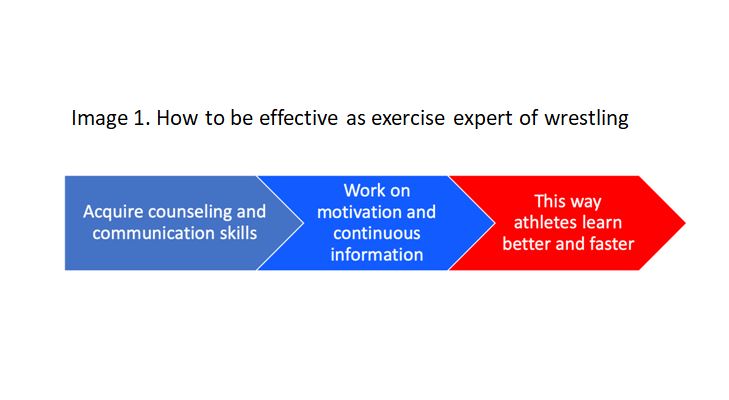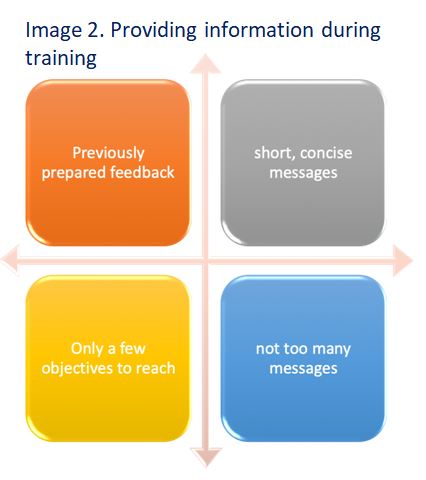
Erasmus+
“This project has been funded with support from the European Commission. This publication reflects the views only of the author, and the Commission cannot be held responsible for any use which may be made of the information contained therein”
Counseling fostering success WATCH
Upon completion of this module the reader will be able to:
- Understand why counselling and communication skills between the exercise expert and the athletes are crucial for every day effectiveness and how to be applied into daily training sessions
- Understand how effective feedback enhance communication and performance.
- Understand how to provide information as basic communication skill in wrestling
First, it is strongly suggested to review
Benz JA,WinkelmanN, Porter J, and Nimphius S. (2016) Coaching instructions and cues for enhancing sprint performance. J Strength Cond Res 38:1–11.
Furley P and Wood G. (2016) Working memory, attentional control, and expertise in sports: A review of current literature and directions for future research. J Appl Res Mem Cogn 5: 415–425 online publication.
Why Counselling and communication skills are crucial for the effective exercise expert of wrestling?
The core mission of this module is to build quality in terms of communication between the exercise expert and the athletes into daily training sessions for prevention strength and conditioning exercise protocols considering that athletes and exercise experts operate with interplay of thoughts, feelings, physiology, and actions. This interaction is crucial for performance and well-being.
It is widely suggested that a. communication skills should be considered by the exercise experts while guiding their athletes following the rule that achieving good results is accomplished through a focus on the process, not only on the outcome and b. the development of mental skills should be integrated into daily training sessions of healthy athletes for injury prevention.
As with all sports, the impact of mental preparation and the well-being of athletes and team performance has gained increased focus in recent years, as it has now been recognized how much psychology matters (Nesti, 2010).
Especially in young athletes, one of the three fundamental factors related to peak performance is defined as the individual psychological components for peak performance and well-being (Willis, 2017). It is proved helpful to incorporate all psychological topics and variables into a unifying model of psychological preparation to peak performance (Hardy et al, 1996). In this context, communication skills are also considered as a key definer of the culture of excellence, the other fundamental factor for peak performance in soccer (Willis, 2017). It directly affects the athletes’ ability to be productive, their sense of accomplishment, and even their quality of life. Working daily at being excellent has an impact on how athletes interact with each other and how they handle success and failure (Nesti, 2010). In wrestling, each athlete has to deal first with himself, its own limits and then against its opponent.
As such, the exercise expert’s profession working with wrestlers becomes more and more complicated. Besides an outstanding knowledge of the fight, it is necessary to fully master counselling and communication skills and apply them through motivation and continuous information to help wrestlers learn better and faster. An effective coach not only delivers technical instructions, but he/she must also know how to provide learning for the people they work with. The information that does not reach athletes adequately is useless information.
Image 1 How to be effective as exercise expert of wrestling

Giving feedback and providing Information as basic communication skills in wrestling
Feedback, for the purposes of our project, informs the athletes about what they have to do in order to execute correctly a specific task, pointing them out the achieved goal, rhythm, technique etc of this specific task. What the exercise expert wants to accomplish first, is that the wrestler associates the proposed behaviour to its consequence.
For that reason, coaches use verbal instruction to focus an athlete’s attention on pertinent aspects of a skill. Depending on the context, this focus of attention can be either internal or external (Benz et al, 2016). An internal instruction directs focus to body movements, joint angles, or the action itself, whereas an external instruction pertains to the desired outcome, an implement (golf club, ball, etc.) or the environment (Benz et al, 2016; Wulf et al, 1998). Choosing words carefully is critical as proper instructions can “load the working memory,” priming the mind for processing and attention appropriate for that skill (Furley et al, 2016). This study demonstrates that attentional focus instructions significantly influence several CMJ jump variables (including jump height). The finding that instructions can alter efficiency and performance of a skill indicate that they need to be designed and applied to suit the context.
A recent research (Januário et al, 2016) has analysed how the athletes retain the feedback provided by the coaches. In total, 1728 feedbacks issued by the coaches during the training sessions were analyzed. The results revealed several conclusions of great practical relevance:
- In 65.5% of the feedbacks, the players had difficulties to reproduce completely the coaches’ instructions. That is to say, only 34.5% of the feedbacks were completely retained;
- The more the coach provided different instructions, the lower the feedback retention.
- The higher the level of the athletes, the higher the feedback retention.
The practical applications of this study indicated that coaches should very much take into consideration some specific points at the time of providing information or feedback to the players:
- It is not only inefficient but, in many cases, it is also dangerous to provide too many messages (feedbacks) to the athletes during the tasks. Attention is limited and providing much information usually produces that a good part of the instructions received is forgotten.
- The design of the sessions should include a few objectives to reach. The lower the age or level of the athletes, it is recommendable to include only 1 or 2 objectives in each session; when the level is higher, some more can be added. (examples from the videos)
- Coaches should have previously prepared the feedbacks they are going to provide to reinforce the achievement of the objectives planned in the session, e.g technical correctness.
- Short, concise messages with an understandable language usually reach wrestlers more effectively.
Take home message! Try to highlight the main points of the appropriate technique, In this way you help the athletes understand what they must do in order to execute correctly for safety and enhanced technique or performance. Help them to find out the “solution” to a certain “situation”, i.e the way to execute a skill effectively and successfully.
Image 2. Providing information during training

Bibliography and the additional learning materials
Take home message!
Try to highlight the main points of the appropriate technique, In this way you help the athletes understand what they must do in order to execute correctly for safety and enhanced technique or performance. Help them to find out the “solution” to a certain “situation”, i.e the way to execute a skill effectively and successfully.
Benz JA,WinkelmanN, Porter J, and Nimphius S. (2016) Coaching instructions and cues for enhancing sprint performance. J Strength Cond Res 38:1–11.
Furley P and Wood G. (2016) Working memory, attentional control, and expertise in sports: A review of current literature and directions for future research. J Appl Res Mem Cogn 5: 415–425.
Hardy, L., Jones, G., & Gould, D. (1996). Understanding psychological preparation for sport: Theory and practice. Chichester, UK: Wiley.
Januário, N., Rosado, A., Mesquita, I., Gallego, J. y Aguilar-Parra, J.M. (2016). Determinants of feedback retention in soccer players. Journal of Human Kinetics,51: 235-241.
Nesti, M. (2010) Psychology in Football: Working with elite and professional players, London: Routledge.
Willis, A. (2017) 4 mental skills to develop in young athletes https://www.workinsports.com/blog/4-mental-skills-to-develop-in-young-athletes/
Wulf G, Hoeß M, and Prinz W. Instructions for motor learning: Differential effects of internal vs. external focus of attention (1998) J Mot Behav 30:169–179.
[ays_quiz id=’30’]
Erasmus+
“This project has been funded with support from the European Commission. This publication reflects the views only of the author, and the Commission cannot be held responsible for any use which may be made of the information contained therein.”
